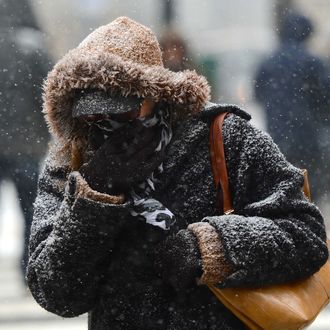
Something funny happens in the days leading up to a big snowstorm: A lot of people who know next to nothing about snowstorms suddenly start acting like they know a lot about snowstorms. In an FAQ about the blizzard, for instance, science writer Dennis Mersereau addresses this phenomenon thusly:
Q: My friend’s cousin on Facebook said that we’re gonna get a—
A: Ignore him.Q: But my friend says that he’s never wr—
A: Ignore. Him.Q: The Virginia Snowstorm Action Authority 3000 Facebook page said that we’re gonna get—
A: That page is also run by your friend’s 12-year-old cousin. Ignore it.
There are a lot of people spreading questionable information, in other words, and if it seems like those who are loudest about their perceived weather expertise are the ones who least know what they’re talking about, well, that’s not very surprising to psychologists who study self-perceived knowledge. “[T]his is a great example of overclaiming,” University of Chicago psychologist Nicholas Epley told Science of Us in an email. He’s referring to the notion that people tend to overestimate their knowledge on a given subject, especially when they think they know a lot about the subject. You’ve been skimming a lot of news articles about the weather this week, and bam — you start considering yourself more knowledgeable about meteorology than you probably are.
Epley points to research published last year in Psychological Science, which found that people can be manipulated into overclaiming, too, if you lull them into feeling like they know more than they really do. In one experiment, researchers had some people take an easy U.S. geography quiz, in order to “boost [their] self-perceived expertise in geography”; others were subjected to a more difficult one. Then, both groups were given an “overclaiming questionnaire,” which listed 15 places in the U.S. and asked them to rank their familiarity with each place — except three of those places weren’t real. (Though I hear Cashmere, Oregon, is lovely this time of year.) Those who had taken the easy quiz fell for more of the fake places, suggesting, the authors argue, that feeling like an expert — by, for example, vaguely remembering some the outline of some story you read about the snowstorm — can lead to people playing a little fast and loose with the actual, you know, facts.
This is annoying when it comes to overclaiming expertise about something like the weather. But it can have potentially dangerous effects in other contexts, the researchers write.
Self-perceived experts may give bad counsel when they should give none. For instance, an individual considering a financial decision may consult a friend who expresses confidence in her financial knowledge. That friend may provide inappropriate advice because she fails to recognize her insufficient familiarity with the question.
Further, a tendency to overclaim may discourage individuals from educating themselves in precisely those areas in which they consider themselves knowledgeable and that may be important to them. In other words, overclaiming may hinder people from truly achieving a valuable level of genuine knowledge.
It may be best, in other words, to first assume you know nothing, and start from there.

